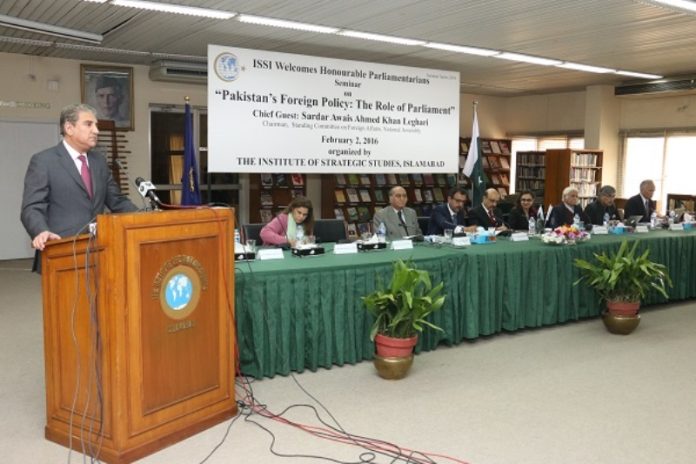Press Release by the Institute of Strategic Studies, Islamabad
February 02, 2016
The Institute of Strategic Islamabad (ISSI) organised a Seminar on “Pakistan’s Foreign Policy: Role of the Parliament” today. The Chief Guest on the occasion was, H.E. Sardar Awais Ahmed Khan Leghari, Chairperson of the Standing Committee of National Assembly on Foreign Affairs. Other dignitaries of the seminar included, Mr. Makhdoom Shah Mahmood Hussain Qureshi, Memeber National Assemble and Former Federal Minister; Ms. Marvi Memon, Memeber National Assemble and Chairperson Benazir Income Support programme (BISP); Mr. Farhatullah Babar, Senator and Former Spokesperson of Presidential Office; Ambassador Fauzia Nasreen, Head of Department, Center for Policy Studies Comsats; Mr. Ahmed Bilal Mehboob, President, PILDAT Mr. Muhammad Rashid Mafzool Zaka , Acting Executive Director PIPS and Professor Dr. Rifaat Hussain HoD Government and Public Policy NUST.
Ambassador Masood Khan, Director General ISSI in his welcome remarks stated that Pakistan needs the guidance and inputs of Parliament, which has its ears to the ground and its finger on the pulse of the people of Pakistan.
The Chairman Standing Committee on Foreign Affairs, National Assembly, Sardar Awais Ahmed Khan Leghari said that the committee is trying to improve it’s workings, so that the Executive is better informed. However, the work of the committee is restricted by resources and academic constraints. Pakistan, for the first time, is discussing sensitive issues in parliament. He also said that the committee is looking at 5 clusters: US-China, GCC, Regional integration, Foreign Office and India. On India he said that there is a need for selected engagement based on result oriented approach, and all peaceful means should be used when dealing with the issue of Jammu and Kashmir.
The other members of the committee and analysts emphasised the need for more discussion and debate in the committee. They said that the institutions are important but they need to be used effectively by creating a balance between the Executive and the Legislature. Furthermore, the policy needs to be owned and supported by majority of the parliament; as foreign policy is a national policy which continues despite change in government. The speakers also cited that even though the foreign policy of Pakistan has encountered many problems over the years, the resilience of the Pakistani leaders has helped the country weather several complex situations. In contemporary times, foreign policy has become complex and multi-layered and is moving away from security oriented approaches to economic diplomacy and green environment. There is a need to link academia with policy makers and practitioners. In this regard, the Standing Committee on Foreign Affairs has been reaching out to both the academia and think tanks. For the future, there needs to be prime focus on areas such as regional connectivity, foreign trade and transit. A continued, constructive engagement of parliament in foreign affairs is essential and the two institutions – the parliament and foreign office – need to work hand in hand. It was suggested that the parliament does not need to copy foreign models but create a domestic version of decision making, based on knowledge and informed citizenry.
The Chairman Board of Governors ISSI, Ambassador Khalid Mahmood in his concluding remarks said that the standing committees of the parliament should be representative of all parties and have a guiding and supporting role. He further added that parliament is the only institution where all issues should be discussed and a national consensus be formed.












